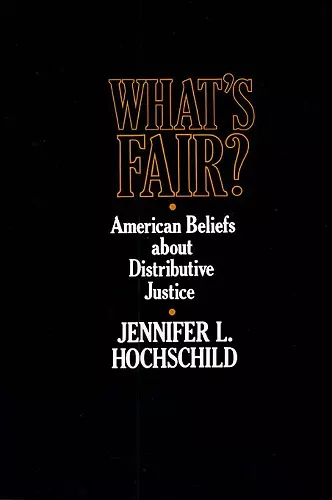What’s Fair
American Beliefs about Distributive Justice
Format:Paperback
Publisher:Harvard University Press
Published:31st Jan '86
Currently unavailable, and unfortunately no date known when it will be back

Jennifer Hochschild's book is an impressive work which tackles an intellectual problem of obvious importance, the complex views of the ordinary American citizen about equality. Using the results of lengthy, in-depth interviews, Ms. Hochschild manages to present an enormous amount of evidence without ever losing sight of her larger project. She writes well and handles the quotations from her subjects with sensitivity and clarity. -- Kay L. Schlozman, coauthor of Injury to Insult: Unemployment, Class, and Political Response This is the work of a quite exceptional mind and demonstrates a fine sense of complexity, of texture, of depth, and of honesty. It combines a theoretical schema about justice or equality with a series of well-conducted interviews about justice or equality in family, school, polity, and economy. -- Douglas Rae, coauthor of Equalities
Using a long questionnaire and in-depth interviews, Hochschild examines the ideals and contemporary practices of Americans on the subject of distributive justice, and discovers neither the rich nor the nonrich support the downward redistribution of wealth.
The search for equality has been an enduring one in the United States. Yet there has been little significant change in the distribution of wealth over the generations, while the political ideology of socialism has been rejected outright by most people. In a sensitive rendering of data, Jennifer Hochschild discovers that it is the nonrich themselves who do not support the downward redistribution of wealth.
Using a long questionnaire and in-depth interviews, she examines the ideals and contemporary practices of Americans on the subject of distributive justice. She finds that both rich and poor Americans perceive three realms in their lives: the private, the political, and the economic. People tend to support equality in two of the realms: the private, where fundamental socialization takes place in the family, school, and neighborhood, and the political, where issues arise about taxes, private property, rights, political representation, social welfare policies, and visions of utopia. But in the economic realm of the workplace, class structure, and opportunity, Americans favor maintaining material differences among people.
Hochschild shows how divergence between ideals and practices, and especially between Americans’ views of political and economic justice, produces ambivalence. Issues involving redistribution of wealth force people to think about whether they prefer political equalization or economic differentiation. Uncertain, Americans sometimes support equality, sometimes inequality, sometimes are torn between these two beliefs. As a result, they are often tense, helpless, or angry.
It is not often that Americans are allowed to talk so candidly and within rigorous social science sampling about their lives. Hochschild gives us a new combination of oral history and political theory that political scientists, philosophers, sociologists, and policymakers can read with profit and pleasure.
A well written, interesting, and pertinent study… This book will have a significant impact because of the excellent quality of the research and also because of the important questions it generates. * American Political Science Review *
What the book succeeds in showing admirably is that the person in the street can make sophisticated, reasoned and complex judgments about problems of economic justice. Moreover, Hochschild does a good job in revealing the emotional colour that people attach to their distributive judgments… This is an illuminating and thought-provoking book. * Journal of Social Policy *
This is the work of a quite exceptional mind and demonstrates a fine sense of complexity, of texture, of depth, and of honesty. It combines a theoretical schema about justice or equality with a series of well-conducted interviews about justice or equality in family, school, polity, and economy. -- Douglas Rae, coauthor of Equalities
Jennifer Hochschild’s book is an impressive work which tackles an intellectual problem of obvious importance, the complex views of the ordinary American citizen about equality. Using the results of lengthy, in-depth interviews, Ms. Hochschild manages to present an enormous amount of evidence without ever losing sight of her larger project. She writes well and handles the quotations from her subjects with sensitivity and clarity. -- Kay L. Schlozman, coauthor of Injury to Insult: Unemployment, Class, and Political Response
ISBN: 9780674950870
Dimensions: unknown
Weight: 454g
360 pages